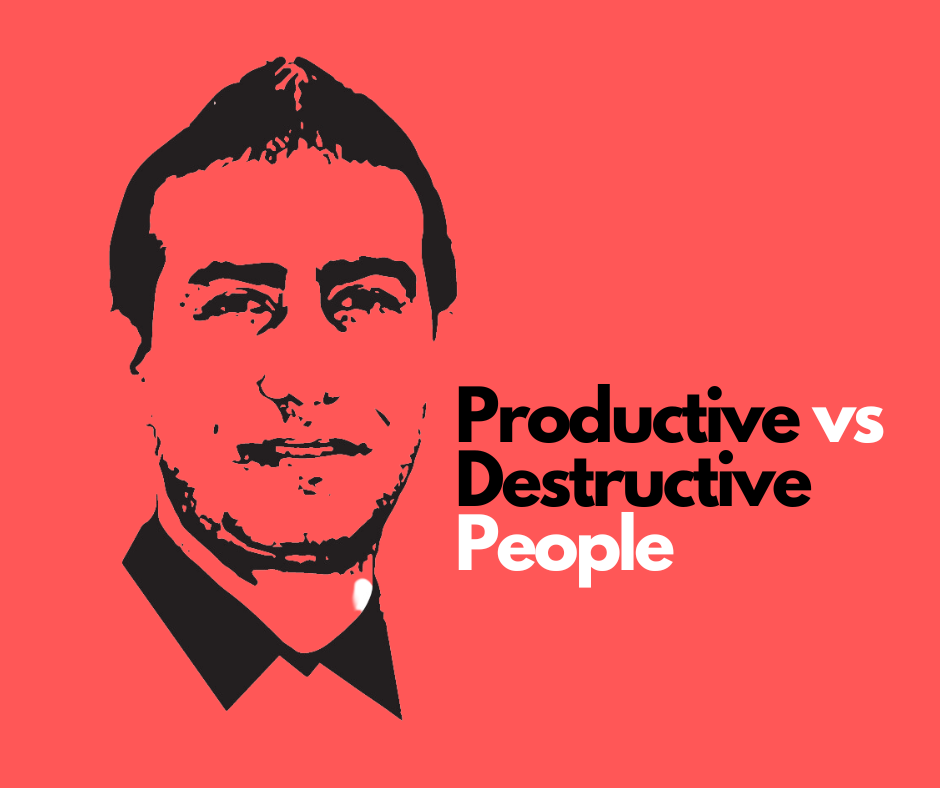Productive vs Destructive People: Reform, Perform, Transform
In every sphere of life, we encounter individuals who either contribute positively or detract from progress. These individuals can be categorized into two distinct groups: productive and destructive people. The impact of their presence extends beyond personal interactions, influencing the overall dynamics of teams, organizations, and communities. Understanding the difference between these two groups and striving to reform, perform, and transform can lead to a more harmonious and prosperous environment for all.
Productive people are those who consistently contribute to the betterment of themselves and those around them. They possess a growth mindset, actively seek opportunities for self-improvement, and strive for excellence in their endeavors. Productive individuals are motivated, goal-oriented, and proactive in their approach. They take ownership of their actions and responsibilities, demonstrating reliability, dedication, and a strong work ethic.
One of the distinguishing characteristics of productive people is their ability to collaborate effectively. They value teamwork and understand the power of synergy. They contribute their unique strengths and skills to achieve shared goals, fostering a sense of unity and cohesion. Productive individuals are excellent communicators, actively listening, providing constructive feedback, and encouraging others to grow and thrive. They inspire others through their positive attitude, perseverance, and willingness to support and uplift those around them.
In contrast, destructive people undermine progress and harmony. They exhibit behaviors that hinder growth, create discord, and impede collective efforts. Destructive individuals may possess negative attitudes, engage in gossip or backbiting, and exhibit a lack of accountability for their actions. They may exhibit selfishness, focusing solely on their personal gains at the expense of others. Their actions can disrupt the flow of work, erode morale, and hinder the attainment of goals.
However, it is essential to recognize that destructive behavior is not innate but can be transformed. The key lies in fostering a culture of reform, where individuals are encouraged to reflect upon their actions, take responsibility, and embrace personal growth. By providing constructive feedback, mentorship, and opportunities for development, destructive individuals can be guided towards more positive and productive behavior. It is crucial to approach this reform process with empathy, patience, and a belief in the potential for change.
Reforming destructive behavior requires a willingness to introspect and identify the underlying causes. Often, destructive behavior stems from personal insecurities, unresolved conflicts, or a lack of understanding of one’s impact on others. By addressing these root causes and providing support, individuals can be encouraged to develop self-awareness and make positive changes. This process may involve coaching, counseling, or training to enhance emotional intelligence, communication skills, and conflict resolution abilities.
As individuals reform and shift towards more productive behavior, they can actively contribute to the overall performance of teams and organizations. The transformation from destructive to productive behavior brings numerous benefits, including increased collaboration, improved morale, and enhanced productivity. By embracing a growth mindset, individuals become catalysts for positive change, fostering a culture of continuous improvement, and inspiring others to do the same.
Organizations and communities must also create an environment that rewards and recognizes productive behavior. By celebrating achievements, providing opportunities for growth, and fostering a supportive culture, organizations can incentivize individuals to perform at their best. This includes establishing clear goals, providing resources and support, and promoting a sense of purpose and meaning in the work being done.
Ultimately, the transformation from destructive to productive behavior requires a collective effort. It is not solely the responsibility of the individual, but also of leaders, managers, and peers to foster an environment conducive to growth and reform. By promoting open communication, collaboration, and accountability, organizations can create a positive ecosystem where individuals can thrive, contribute their best, and collectively achieve transformative results.
In conclusion, the dichotomy between productive and destructive people has far-reaching implications for personal growth, teamwork, and organizational success. By recognizing the characteristics of productive individuals and working towards reforming destructive behavior, we can create an environment that encourages high performance, collaboration, and personal growth. Through a collective commitment to reform, perform, and transform, we can build a better future, both individually and collectively, and create a positive ripple effect that extends beyond ourselves.




